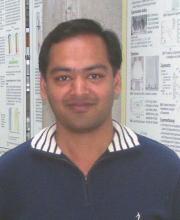For more details, visit the MML Group webpage.
Research Interests:
- Experimental and DFT-based thermochemical data
- Cluster Variation Method and Cluster Expansion based Gibbs energy models
- Developing algorithms and software for phase diagram assessment optimization
- Development of CALPHAD databases and their applications in novel materials and processes
Biography:
Vikas Jindal is a Professor in the Department of Metallurgical Engineering at the Indian Institute of Technology (Banaras Hindu University), Varanasi. He holds a Ph.D. in Metallurgical Engineering from IIT(BHU), an M.S. from the National University of Singapore, and a B.Tech. from IIT Kanpur. With extensive experience in academia and industry, his research focuses on computational thermodynamics, particularly in developing models and databases for materials science applications.
Selected Publications:
- V. Jindal, S. Lele, Multicomponent cluster variation method: Application to high entropy alloys, Calphad. 89 (2025) 102825. https://doi.org/10.1016/j.calphad.2025.102825
- S. Kumar, A. Linda, Y. Shadangi, V. Jindal, Influence of micro-segregation on the microstructure, and microhardness of MoNbTaxTi(1-x)W refractory high entropy alloys: Experimental and DFT approach, Intermetallics. 164 (2024) 108080. https://doi.org/10.1016/j.intermet.2023.108080
- S. Kumar, V. Jindal, Modeling Short-Range Ordering in Binary BCC Ti-X (X = Nb, V, Zr) Alloys using CE-CVM, J. Phase Equilibria Diffus. 43 (2022) 511–526. https://doi.org/10.1007/s11669-022-00989-y
- J. Du, V. Jindal, A.P. Sanders, K.S. Ravi Chandran, CALPHAD-guided alloy design and processing for improved strength and toughness in Titanium Boride (TiB) ceramic alloy containing a ductile phase, Acta Mater. 171 (2019) 18–30. https://doi.org/10.1016/j.actamat.2019.03.040
- V. Jindal, B. Nageswara Sarma, S. Lele, An improved CVM entropy functional for binary fcc alloys, Comput. Mater. Sci. 84 (2014) 129–133. https://doi.org/10.1016/j.commatsci.2013.11.062
Teaching:
- MT-305: Heat Treatment
- MT301: Modeling and Simulation in Metallurgy
- MT-561: Computational Methods for Metallurgy
Professional Experience:
- Professor, Department of Metallurgical Engineering, IIT(BHU), Varanasi (December 2024-Present)
- Associate Professor, Department of Metallurgical Engineering, IIT(BHU), Varanasi (July 2016-December 2024)
- Post-doctoral Fellow, University of Utah, USA (May 2015-July 2016)
- Assistant Professor, Department of Metallurgical Engineering, IIT(BHU), Varanasi (August 2007-June 2016)
Research Group:
Dr. Jindal leads the Materials and Machine Learning (MML) Group at IIT(BHU), focusing on computational thermodynamics and materials design. He has advised numerous graduate and undergraduate students in their research projects. For more details, visit the MML Group webpage.
